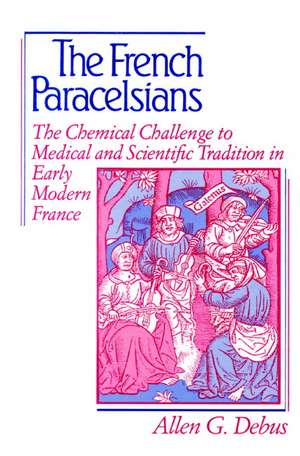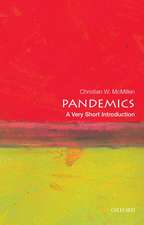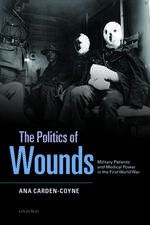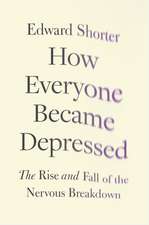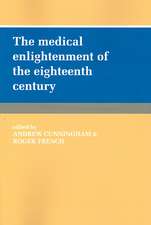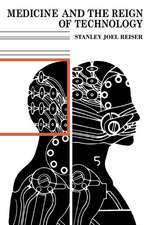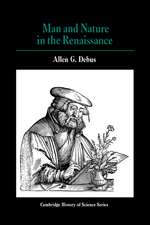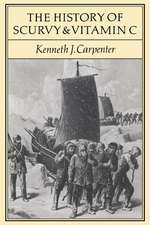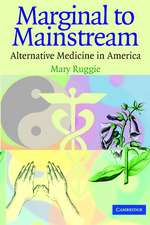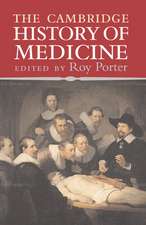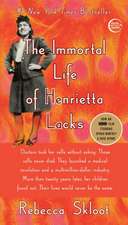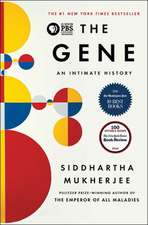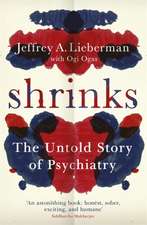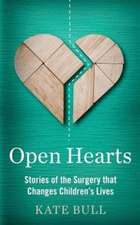The French Paracelsians: The Chemical Challenge to Medical and Scientific Tradition in Early Modern France
Autor Allen George Debusen Limba Engleză Paperback – 14 aug 2002
| Toate formatele și edițiile | Preț | Express |
|---|---|---|
| Paperback (1) | 312.97 lei 43-57 zile | |
| Cambridge University Press – 14 aug 2002 | 312.97 lei 43-57 zile | |
| Hardback (1) | 741.92 lei 43-57 zile | |
| Cambridge University Press – 24 oct 1991 | 741.92 lei 43-57 zile |
Preț: 312.97 lei
Preț vechi: 329.45 lei
-5% Nou
Puncte Express: 469
Preț estimativ în valută:
59.89€ • 62.69$ • 49.55£
59.89€ • 62.69$ • 49.55£
Carte tipărită la comandă
Livrare economică 07-21 aprilie
Preluare comenzi: 021 569.72.76
Specificații
ISBN-13: 9780521894449
ISBN-10: 0521894441
Pagini: 268
Ilustrații: 25 b/w illus.
Dimensiuni: 152 x 229 x 17 mm
Greutate: 0.4 kg
Ediția:Revised
Editura: Cambridge University Press
Colecția Cambridge University Press
Locul publicării:Cambridge, United Kingdom
ISBN-10: 0521894441
Pagini: 268
Ilustrații: 25 b/w illus.
Dimensiuni: 152 x 229 x 17 mm
Greutate: 0.4 kg
Ediția:Revised
Editura: Cambridge University Press
Colecția Cambridge University Press
Locul publicării:Cambridge, United Kingdom
Cuprins
Preface; List of illustrations; 1. Paracelsism and medical tradition; 2. Chemistry and medicine in France: the early years; 3. Paris and Montpellier: the great chemical debates; 4. Chemical continuity and the new philosophy; 5. Alchemy and the chemical philosophers in the early eighteenth century; 6. Postscript; Notes; Bibliography.
Recenzii
"Debus has dramatically enriched our knowledge of Renaissance and modern science, including themes and figures that traditional historians of science have neglected. Thanks to Debus's studies, the relevance of individuals like Paracelsus, Robert Fludd and Jean-Baptiste van Helmont to modern science and philosophy is now recognised....The author draws on an impressive array of documents...." Antonio Clericuzio, Times Higher Education Supplement
"...describes the internecine warfare in a clear and readable manner with just the right amount of quotation. The book is written with great authority and I am sure it will be the definitive account of this episode in the history of medicine for many years to come." A. R. Butler, New Scientist
"...an important contribution to the history of pharmacy and to some aspects of the early history of chemistry and of medicine." Maurice Crosland, Nature
"...succeeds admirably in documenting the `chemical challenge' to both medical and scientific tradition in early modern France. A very readable yet scholarly account, handsomely illustrated; very interesting reading for undergraduates and academic specialists alike." J.W. Dauben, Choice
"...a masterly study...." Thomas S. Willard, Studies in Hermeticism
"Debus's use of primary sources is exemplary (16 pages of references--may of them rare and difficult to obtain). His work is a model of scholarship....The book is an essential contribution to a better understanding of one of the most difficult figures in medical history. It is a model of what might be done with other threads of the Paracelsian corpus if one concentrates on primary sources." Edmund D. Pellegrino, Quarterly Review of Biology
"...a major contribution not only ot the study of the history of medicine and the history of both medical and non-medical chemistry but also to the history of science, the history of ideas." Bibliotheque d'Humanisme et Renaissance
"...narrates an important episode whose contributions to the scientific revolution has been largely ignored: the long-standing contention between Paracelsians and Galenists....Debus shows how the purported triumph of the mechanists in the scientific academies was partial at best, recounting the osmotic acceptance of chemistry by the academies. This persistent influence of medical chemistry was significant both for the chemical revolution and as one of the driving forces behind the scientific revolution, and deserves greater recognition by historians.
"...a welcome addition to Allen Debus' studies of the Paracelsian tradition in early modern Europe....As a work of intellectual history, this book is successful. Debus agilely traces the complex development of French Paracelsianism showing its relation to humanist medicine, to Protestantism, and to the new philosophy." William Eamon, Renaissance Quarterly
"...describes the internecine warfare in a clear and readable manner with just the right amount of quotation. The book is written with great authority and I am sure it will be the definitive account of this episode in the history of medicine for many years to come." A. R. Butler, New Scientist
"...an important contribution to the history of pharmacy and to some aspects of the early history of chemistry and of medicine." Maurice Crosland, Nature
"...succeeds admirably in documenting the `chemical challenge' to both medical and scientific tradition in early modern France. A very readable yet scholarly account, handsomely illustrated; very interesting reading for undergraduates and academic specialists alike." J.W. Dauben, Choice
"...a masterly study...." Thomas S. Willard, Studies in Hermeticism
"Debus's use of primary sources is exemplary (16 pages of references--may of them rare and difficult to obtain). His work is a model of scholarship....The book is an essential contribution to a better understanding of one of the most difficult figures in medical history. It is a model of what might be done with other threads of the Paracelsian corpus if one concentrates on primary sources." Edmund D. Pellegrino, Quarterly Review of Biology
"...a major contribution not only ot the study of the history of medicine and the history of both medical and non-medical chemistry but also to the history of science, the history of ideas." Bibliotheque d'Humanisme et Renaissance
"...narrates an important episode whose contributions to the scientific revolution has been largely ignored: the long-standing contention between Paracelsians and Galenists....Debus shows how the purported triumph of the mechanists in the scientific academies was partial at best, recounting the osmotic acceptance of chemistry by the academies. This persistent influence of medical chemistry was significant both for the chemical revolution and as one of the driving forces behind the scientific revolution, and deserves greater recognition by historians.
"...a welcome addition to Allen Debus' studies of the Paracelsian tradition in early modern Europe....As a work of intellectual history, this book is successful. Debus agilely traces the complex development of French Paracelsianism showing its relation to humanist medicine, to Protestantism, and to the new philosophy." William Eamon, Renaissance Quarterly
Descriere
A 1992 account of the prolonged struggle between Paracelsians and Galenists, and its significance for the scientific revolution.
